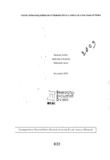Factors influencing utilization of Manoshi delivery centers in urban slums of Dhaka
Citation
Rashid, S., Nasreen, H. E., & Akter, M. (2009, December). Factors influencing utilization of Manoshi delivery centers in urban slums of Dhaka. Research Reports (2009): Health Studies, Vol - XLI, 32–53.Abstract
BRAC introduced Manoshi - a community-based maternal, neonatal and child health initiative in
urban slums of Bangladesh in 2007. Community delivery centers were established to provide
appropriate management of delivery and essential newborn care along with referral facilities. A
population and facility-based exploratory qualitative study, conducted during November 2007 to
January 2008, aimed to identify factors affecting the use of delivery centers. Data were collected
through in-depth interviews, focus group discussions, exit interviews, informal discussion with
different service providers and non-participant observations. Findings suggest that slum residents
preferred delivery centers because of free service, delivery attended by trained birth attendants, and
management of complications through referral linkages. Preference of home delivery and essential
newborn care were identified as an important factor that hindered the use of delivery centers though
delivery at the centers was safer than the delivery at home. Other reasons for not using the delivery
centers were preference for family birth attendants, facing no problem at home, and objection from
mothers-in-law. The delivery-centre related factors, namely, absence of medical doctors, non
availability of drugs and injections and fear for surgery were also found to be factors resisting use of
delivery centers. Provision for salary or other incentives for health providers, quality performance,
training of health providers on effective management of complications and good client-provider
interaction may influence better use of delivery centers and play a significant role to continue
Manoshi in urban slums without BRAC support.

